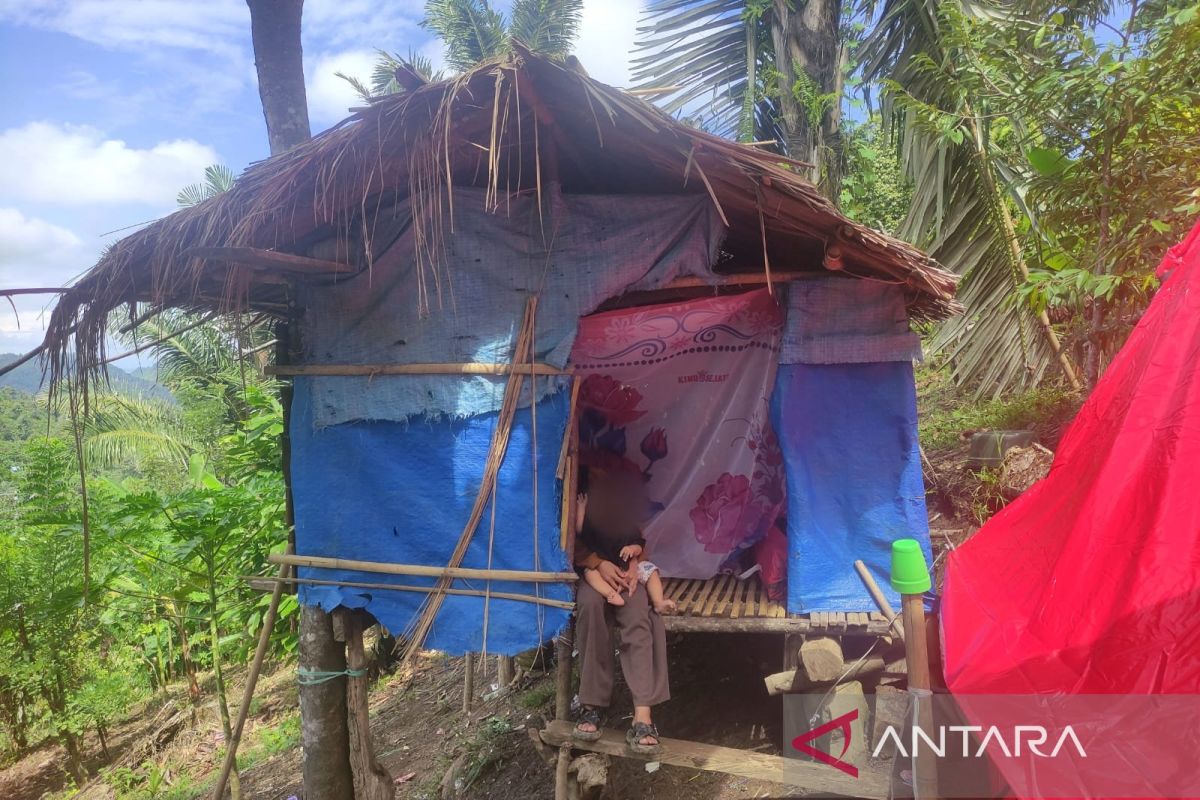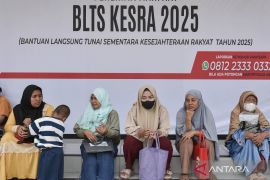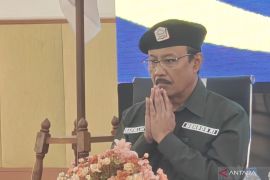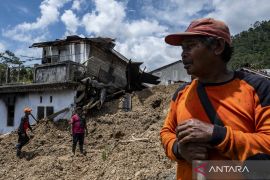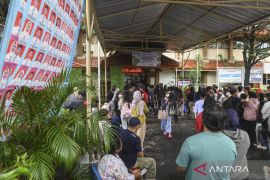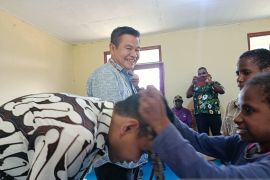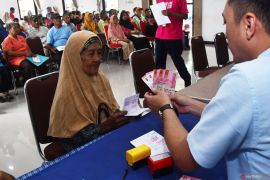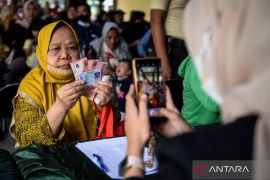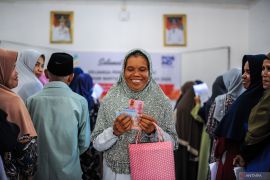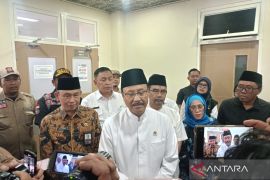She kept looking up at the sky, not the path ahead. She had seemingly memorized the rocky and wet path that led to her home.
Local residents called her Amma Mar. "Amma" means mother in the Mandar language.
That afternoon, the 43-year-old resident of Batetangnga village, Binuang, Polewali Mandar, West Sulawesi, had just visited the village chief's office.
After about 20 minutes of walking, her forehead filled with sweat, she arrived at a wooden shack whose roof was made of dried leaves, which had been patched up several times. Her home was located right on a ridge with a 50-degree slope.
Moored to a coconut tree and surrounded by young cacao trees, the shack was where Amma Mar used to live.
"Yes, this is my house, the shelter we have," the woman, whose full name is Marni, said.
She became a single mother two and a half years ago after divorcing her husband, and she had no choice but to return to her village, though that meant she had to live in a shack near the forest, far from the settlement of other villagers.
Earlier, she lived with her husband in a small house in another village. After the divorce, she tried to survive as a day laborer in Baras, but her past haunted her thoughts.
In August 2021, Marni decided to bring her three children—Abdul, Mira, and Fadly—back to Batetangnga. With just enough money, they had to take turns riding a car to get to Binuang while lugging several cardboard boxes filled with clothes.
It took them 10–12 hours to cross the Majene-Mamuju Road. They had to get on and off the car several times, and to get to Batetangnga, they had to hail a motorcycle taxi.
After arriving at the village, the lives of Marni's children changed drastically. Let alone attending school, they did not have the opportunity to play and get a good night's sleep in a decent house.
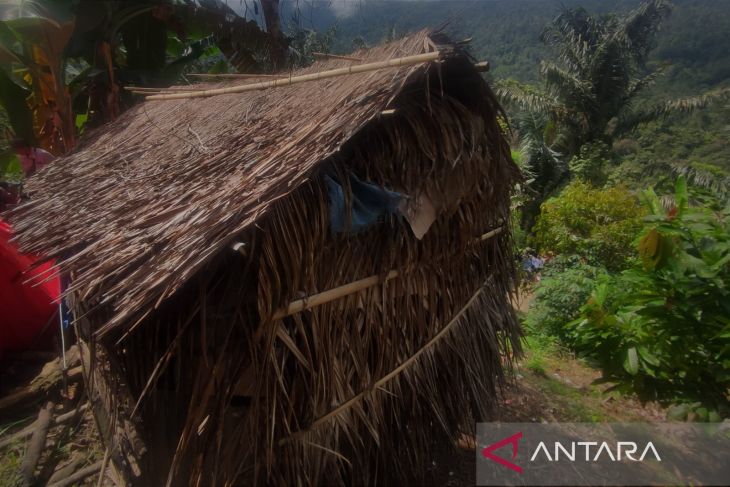
Marni's eldest son, Abdul, 14, had to work on a chicken farm to help supplement the family's income. In one month, he made just Rp500,000 (around US$30).
Meanwhile, her daughter, Mira Wati, 12, had to help her family with all kinds of odd jobs, from selling chili leftovers to picking cacao beans. In one month, she earned a wage of Rp200,000 to Rp300,000.
To unwind after a long day of work, they only had their 2x3-meter shack. To sleep, they had to position themselves in such a way that there was enough space between the bedding, kitchen furniture, and piles of clothes.
Even though they found a way to sleep, they were unable to avoid the cold of the night. The roof made of dried leaves and the cloth door were no protection against pouring rain and the blowing wind.
Marni said that this led her youngest son, Fadly, to whine almost every night, asking for a hug to warm his body. At night, she was often reduced to tears, thinking of the plight of her children.
A new home
Marni's story reached Social Affairs Minister Tri Rismaharini after activists reported her life on social media.
A short video about her shared on social media prompted Rismaharini to visit them in the village.
Village officials in the area prepared for the minister's visit on July 2.
A few hours before Minister Rismaharini arrived that afternoon, a number of trucks came to the village, carrying household furniture, staples, children's toys, and tents for Marni.
More good news was in store for her: the head of Batetangnga village told her that there would be a new house for her, just 200 meters away from her shack.
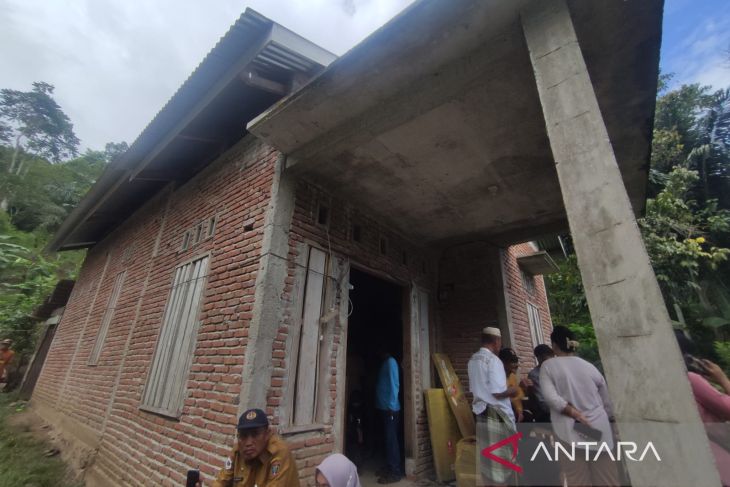
The two-room house, made of bricks and measuring 60 square meters on a land area of 320 square meters, was purchased on a cash payment of Rp130 million (around US$8,000) by the Social Affairs Ministry.
Marni and her children moved directly into the house, which came complete with electricity powered by a 100-watt solar panel. She was also provided with farming tools, chicken livestock, and catfish babies ready to be cultivated.
The assistance from the ministry helped reduce Marni's life burden. However, Minister Rismaharini stressed that local governments need to be more active in collecting data on people in need so that they can be reached by the ministry.
The government is striving to ensure social justice for all Indonesian people, as mandated by the fifth principle of Pancasila.
Related news: Minister invites homeless to inhabit Social Affairs Ministry's flats
Related news: Rp2.3 billion allocated to help homeless, beggars: Ministry
Translator: M Prasetyo, Kenzu
Editor: Anton Santoso
Copyright © ANTARA 2024
